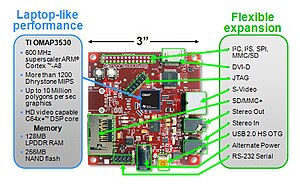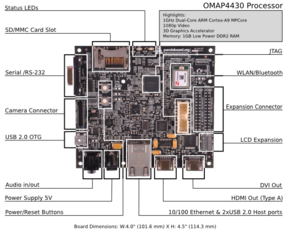
Back Open Multimedia Application Platform German OMAP Spanish OMAP Finnish OMAP French OMAP Italian Texas Instruments OMAP Japanese OMAP Korean Texas Instruments OMAP Polish OMAP Portuguese Texas Instruments OMAP Russian



OMAP (Open Multimedia Applications Platform) is a family of image/video processors that was developed by Texas Instruments. They are proprietary system on chips (SoCs) for portable and mobile multimedia applications. OMAP devices generally include a general-purpose ARM architecture processor core plus one or more specialized co-processors. Earlier OMAP variants commonly featured a variant of the Texas Instruments TMS320 series digital signal processor.
The platform was created after December 12, 2002, as STMicroelectronics and Texas Instruments jointly announced an initiative for Open Mobile Application Processor Interfaces (OMAPI) intended to be used with 2.5 and 3G mobile phones, that were going to be produced during 2003.[1] (This was later merged into a larger initiative and renamed the MIPI Alliance.) The OMAP was Texas Instruments' implementation of this standard. (The STMicroelectronics implementation was named Nomadik.)
OMAP enjoyed some success in the smartphone and tablet market until 2011 when it lost ground to Qualcomm Snapdragon.[2] On September 26, 2012, Texas Instruments announced that they would wind down their operations in smartphone and tablet oriented chips and focus on embedded platforms instead.[3] On November 14, 2012, Texas Instruments announced they would cut 1,700 jobs due to their shift from mobile to embedded platforms.[4] The last OMAP5 chips were released in Q2 2013.
- ^ "STMicroelectronics and Texas Instruments Team Up to Establish an Open Standard for Wireless Applications". Dallas and Geneva: STMicroelectronics. 2002-12-12. Archived from the original on 2003-02-12. Retrieved 2012-12-24.
- ^ "Texas Instruments admits defeat, moves focus away from smartphone processors". 26 September 2012.
- ^ "UPDATE 3-Texas Instruments eyes shift away from wireless". Reuters. 25 September 2012.
- ^ Fingas, Jon (2012-11-14). "Texas Instruments to cut 1,700 jobs as part of its shift away from mobile". Engadget.com. Retrieved 2013-07-10.